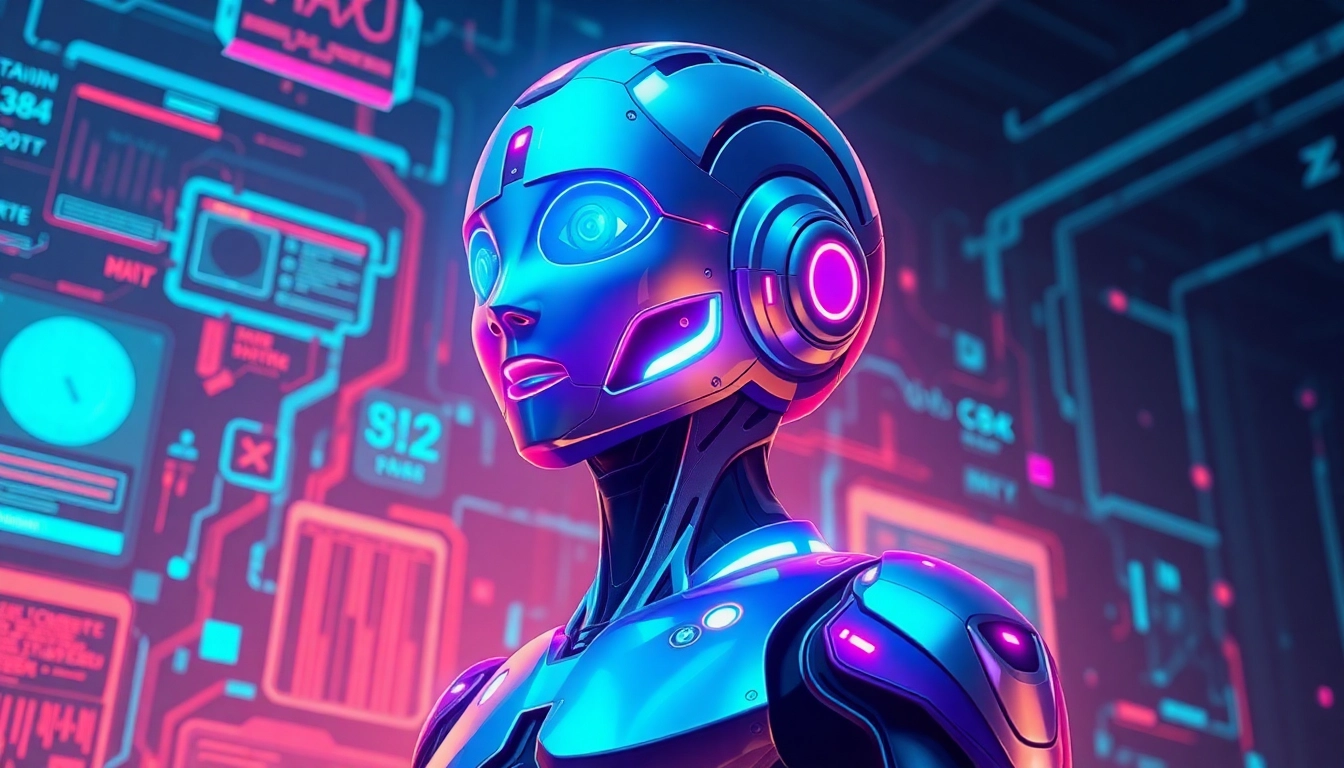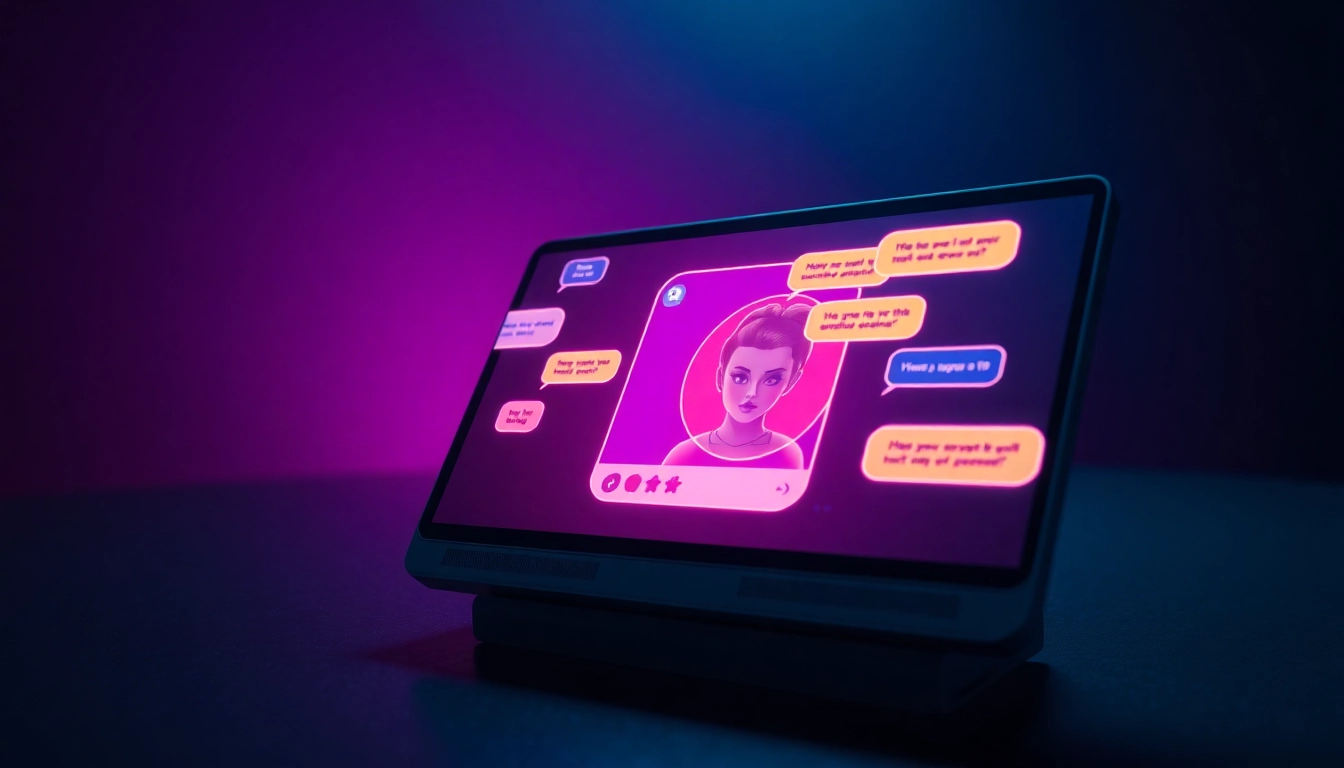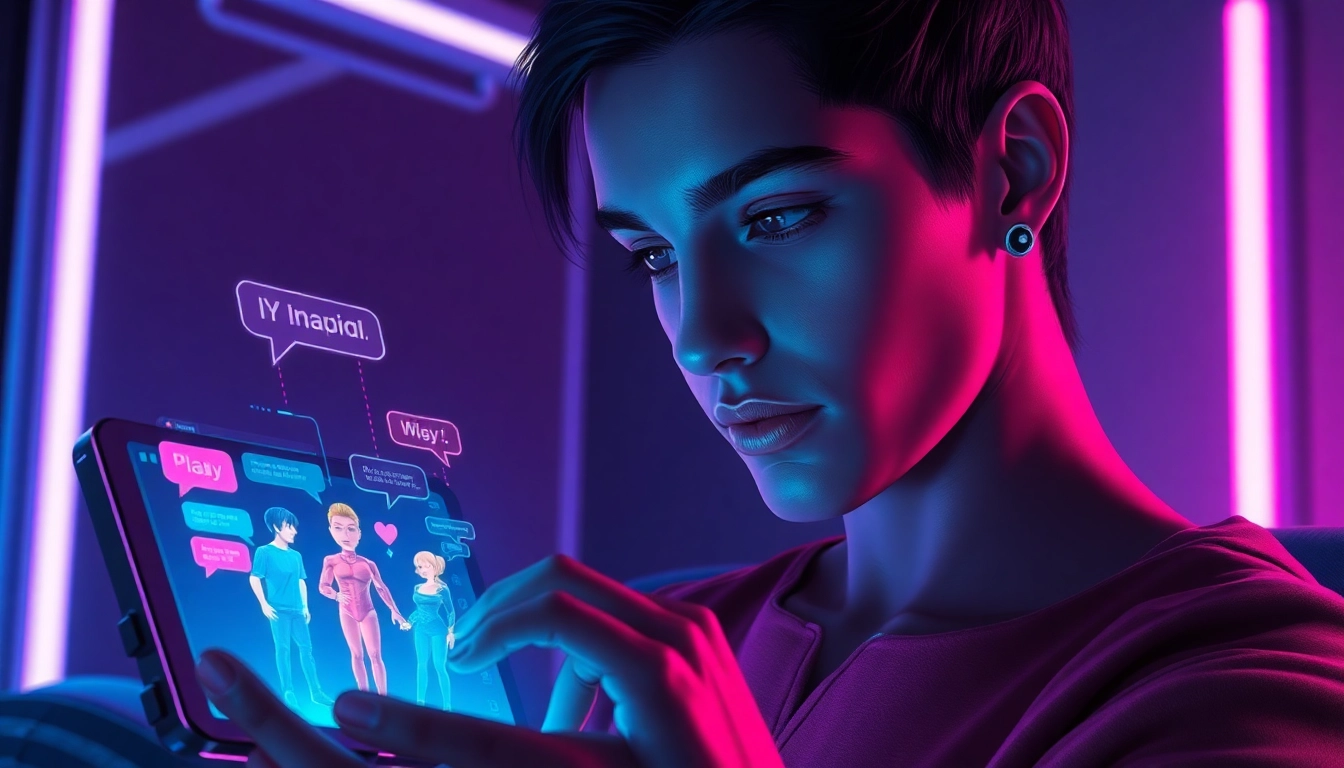Introduction: The Growing Popularity of AI Companionship Platforms
In recent years, technological innovations have profoundly reshaped the way humans seek connection, companionship, and entertainment. Among these advancements, AI-powered platforms have emerged as a significant phenomenon, offering personalized interactions that mimic human-like conversations. The rise of sext ai and AI companionship apps reflects a broader societal shift toward embracing digital intimacy and virtual relationships. These platforms leverage cutting-edge artificial intelligence to create engaging, customizable, and accessible experiences that cater to diverse emotional and social needs. Whether for casual chatting, roleplay, or more intimate interactions, AI companionship platforms are transforming the landscape of personal relationships, blurring the lines between human and machine interaction, and opening new avenues for emotional fulfillment in the digital age.
What Is CrushOn AI? Features and Capabilities
CrushOn AI stands out as a sophisticated chatbot platform that enables users to craft and interact with highly customizable AI characters. Unlike traditional chatbots, CrushOn AI offers a rich set of features designed to simulate genuine conversational experiences. At its core, the platform harnesses advanced language models like GPT-4o mini and Claude 3.5 Sonnet, ensuring responses are natural, context-aware, and engaging. This technological backbone allows CrushOn AI to deliver conversations that feel authentic, whether users are seeking casual companionship, creative storytelling, or roleplay scenarios.
One of the platform’s key strengths is its emphasis on customization. Users can select from a library of pre-made characters—each with distinct personalities, backstories, and traits—or create their own AI characters tailored to their preferences. This personalization extends beyond superficial traits; users can define detailed backstories, personality quirks, and conversational styles, making each AI character unique and aligned with their desires.
Another notable feature is the contextual memory system. Unlike basic chatbots that forget previous interactions, CrushOn AI remembers past conversations, enabling continuity across sessions. This memory system enhances the realism of interactions, allowing AI characters to recall previous topics, preferences, and personal details, thereby fostering a sense of ongoing relationship and emotional depth.
Furthermore, CrushOn AI supports multi-character group chats, allowing users to engage with several AI characters simultaneously. This feature is particularly appealing for role-playing games, storytelling, or virtual social gatherings. The platform’s cross-device accessibility ensures seamless interaction whether on a web browser or mobile app, providing flexibility and convenience for users on the go.
CrushOn AI’s deployment of advanced language technology ensures that responses are contextually appropriate, emotionally resonant, and often indistinguishable from human conversation. The platform also emphasizes safety and privacy, giving users control over their data and interactions, which is critical in sensitive or NSFW scenarios.
Exploring the World of Sext AI and AI Girlfriends
The development of sext ai and AI girlfriend applications signifies a notable evolution in AI companionship. These platforms are designed to simulate romantic or intimate relationships, providing users with a virtual partner that can engage in flirtatious, romantic, or NSFW conversations. They cater to individuals seeking emotional solace, companionship, or simply a safe space to explore fantasies without judgment or real-world consequences.
Popular AI girlfriend apps often feature customizable characters that users can personalize to match their ideal partner—whether it’s through appearance, personality traits, or backstories. These AI companions can engage in deep, meaningful conversations, share stories, and even participate in roleplay scenarios that mimic real-life dating or intimate interactions.
Many platforms incorporate multimedia elements such as images, videos, voice chat, and even virtual reality integration to enhance realism and immersion. For example, some apps allow users to generate NSFW images or videos of their AI characters, elevating the experience from text-based to multimedia-rich interactions. This convergence of AI technology with multimedia capabilities creates a vivid, engaging environment for users seeking a virtual romantic experience.
Moreover, these AI systems often include memory features that retain details of past conversations, allowing AI partners to remember personal preferences, significant dates, or specific topics, thereby fostering a sense of familiarity and emotional connection. This is especially important in maintaining engagement and building a sense of ongoing relationship, even if the interaction is entirely virtual.
It’s important to recognize that the popularity of sext AI and AI girlfriends raises ethical questions around consent, privacy, and emotional dependency. While these platforms provide a safe outlet for exploration and companionship, users should approach them with awareness of their limitations and potential psychological impacts. Responsible use, coupled with platform safeguards, is essential for maintaining healthy boundaries in digital relationships.
The Technology Behind AI Relationships: GPT-4, Claude 3.5, and More
The backbone of modern AI companionship platforms like CrushOn AI and other sext AI apps is built on state-of-the-art language models. GPT-4o mini, an optimized variant of OpenAI’s GPT-4, powers many of these systems, offering nuanced understanding and generation of human-like responses. Its ability to interpret complex prompts, maintain context, and produce coherent, emotionally resonant dialogue makes it ideal for creating realistic AI characters.
Complementing GPT-4o mini, models like Claude 3.5 Sonnet from Anthropic are also employed to diversify response styles and improve safety measures. These models are trained on vast datasets, enabling them to generate responses that are contextually appropriate and sensitive to nuanced conversational cues. The integration of multiple language models allows platform developers to tailor AI behaviors, tone, and personality to suit different user preferences and scenarios.
Beyond language models, these platforms leverage sophisticated memory systems that store interaction history, enabling AI characters to recall specific details across sessions. This persistent memory creates continuity, making interactions feel more authentic and personalized. Additionally, multimedia AI capabilities—such as image generation, voice synthesis, and video creation—are increasingly integrated to enrich the user experience further.
The continuous evolution of AI technology promises even more immersive and emotionally intelligent virtual companions in future iterations. Advances in natural language understanding, emotional AI, and multimodal interactions will likely expand the scope and depth of AI relationships, fostering more meaningful and human-like connections.
Customization and Personalization: Creating Your Ideal AI Companion
One of CrushOn AI’s standout features is its comprehensive customization options, empowering users to craft their ideal AI companions. Personalization begins with selecting or designing characters that align with individual preferences—ranging from appearance and personality traits to backstory and conversational style. This level of detail allows users to create AI characters that feel truly unique and tailored to their desires.
For instance, users can define personality parameters such as humor style, emotional tendencies, flirtatiousness, or professionalism. They can also assign specific backstories—whether as a mysterious stranger, a caring partner, or a playful friend—that influence how the AI responds in conversations. These traits can be fine-tuned over time, enabling dynamic evolution of the character’s personality as interactions progress.
Furthermore, CrushOn AI’s character library provides ready-made options for quick setup, while advanced users can delve into detailed trait customization, including preferences, hobbies, and emotional states. This flexibility ensures that whether a user seeks a casual chat partner, a virtual romantic interest, or a roleplaying companion, they can craft an AI that suits their needs.
Personalization extends to conversation context, where users can set specific goals or scenarios for interactions. For example, they might instruct the AI to roleplay as a certain character or to maintain a particular tone—flirty, supportive, or humorous. This granular control makes the platform versatile for various use cases, from creative storytelling to emotional support.
As AI models become more sophisticated, the potential for hyper-personalized virtual companions grows. Future developments may include integrating user preferences from external data sources, enabling even more authentic and emotionally resonant interactions.
Ethical Considerations and Privacy in AI Relationship Platforms
The proliferation of AI companionship platforms introduces crucial ethical and privacy considerations. While these technologies offer unprecedented opportunities for connection and entertainment, they also raise questions about consent, emotional dependency, and data security.
Privacy is paramount, as these platforms often collect sensitive information about users’ preferences, conversations, and personal details. Responsible developers implement robust data protection measures, including encryption and anonymization, to safeguard user information. Clear privacy policies inform users about how their data is stored, used, and shared, fostering transparency and trust.
Consent and user autonomy are vital. Users should be aware of the platform’s capabilities, including the extent to which AI characters can simulate intimacy or emotional attachment. Ethical guidelines should prevent misuse, exploitation, or manipulation, especially in scenarios involving NSFW content or vulnerable individuals.
Moreover, the risk of emotional dependency warrants caution. While AI companions can provide comfort, they should not replace genuine human relationships or serve as substitutes for real social interactions. Platforms should promote healthy usage and include features that encourage balanced engagement.
Additionally, developers face the challenge of preventing AI from generating inappropriate or harmful content. Implementing safety filters, moderation, and user reporting mechanisms are essential steps toward responsible deployment.
Ultimately, fostering ethical AI companionship involves balancing technological innovation with respect for human dignity, privacy, and emotional well-being. Ongoing dialogue among developers, users, and ethicists is necessary to navigate this evolving landscape responsibly.
The Impact of AI Girlfriends on Social and Emotional Well-being
AI girlfriends and sext AI platforms have a multifaceted impact on users’ social and emotional health. For some, these virtual companions serve as valuable outlets for loneliness, social anxiety, or emotional expression. They provide a safe environment to explore feelings, practice communication skills, or fulfill companionship needs without judgment or rejection.
Research indicates that virtual relationships can sometimes enhance emotional resilience, offering comfort during times of stress or social isolation. For individuals with difficulty forming traditional relationships, AI companions can fill a void, providing a sense of connection and understanding.
However, reliance on AI for emotional support also presents potential risks. Overdependence may lead to reduced motivation to seek real-world interactions, exacerbating social withdrawal or emotional detachment. It is essential for users to maintain a healthy balance, recognizing AI relationships as supplementary rather than substitutes for genuine human connection.
Furthermore, the presence of AI companions can influence perceptions of intimacy, trust, and social expectations. As these platforms become more sophisticated, they challenge societal norms around relationships and emotional bonds, prompting discussions about authenticity, consent, and emotional health.
For developers and mental health professionals, understanding these dynamics is crucial to designing platforms that promote positive outcomes, such as fostering empathy, self-awareness, and social skills, while minimizing potential harms.
Future Trends: Advancements in AI, Virtual Reality, and Multimedia Integration
The future of AI companionship is poised for rapid evolution, driven by advancements in artificial intelligence, virtual reality , and multimedia technology. These innovations will create more immersive, emotionally intelligent, and interactive experiences that blur the line between virtual and real-world relationships.
Next-generation AI models will likely feature enhanced emotional recognition and expression capabilities, allowing AI characters to respond to users’ feelings with greater nuance and empathy. Multimodal AI systems will integrate text, speech, images, and videos seamlessly, providing rich, sensory experiences that deepen emotional engagement.
Virtual reality will play a significant role in this evolution, enabling users to enter immersive environments where they can interact with AI characters in 3D spaces, simulating real-world presence. VR headsets combined with haptic feedback devices could offer tactile sensations, making interactions more tangible and realistic.
Furthermore, multimedia content generation—such as personalized images, videos, and voice synthesis—will allow users to customize their AI companions visually and aurally, enhancing authenticity. AI-driven content creation tools will enable dynamic storytelling and scenario crafting tailored to individual preferences.
As these technologies mature, ethical considerations surrounding consent, privacy, and emotional safety will become even more critical. Developers and policymakers will need to establish standards and guidelines to ensure responsible innovation.
Ultimately, the convergence of AI, VR, and multimedia will revolutionize virtual companionship, making it more accessible, engaging, and emotionally satisfying than ever before.
How to Choose the Right AI Companion Platform
Selecting the appropriate AI companionship platform depends on individual needs, preferences, and ethical considerations. When evaluating options, users should consider several key factors:
- Customization Options: Does the platform allow detailed character creation and personalization? Can you define traits, backstories, and scenarios that align with your interests?
- Technological Capabilities: Is the platform powered by advanced language models like GPT-4 or Claude 3.5? Does it support multimedia interactions such as images, videos, or voice chat?
- Memory and Continuity: Does the platform maintain conversation history across sessions? Is there contextual memory that enhances realism?
- Privacy and Security: Are data protection measures in place? Does the platform have transparent privacy policies?
- Community and Support: Is there an active user community or customer support to assist with customization or troubleshooting?
- Use Case Suitability: Does the platform cater to your specific goals—be it casual conversation, roleplay, or intimate interactions?
Users should also be mindful of ethical considerations and set boundaries for their engagement. Responsible usage involves understanding the platform’s limitations and avoiding over-reliance on virtual relationships.
By carefully weighing these factors, individuals can find a platform that offers meaningful, safe, and satisfying AI companionship tailored to their personal needs.
Conclusion: Embracing the Digital Evolution of Personal Relationships
The emergence of platforms like CrushOn AI and other advanced AI companionship systems signifies a profound shift in how humans experience connection in the digital age. These technologies harness the power of artificial intelligence to create personalized, engaging, and emotionally resonant interactions that cater to a wide spectrum of needs—from casual conversation and storytelling to intimate companionship.
As AI models continue to evolve, integrating multimedia capabilities and immersive environments such as virtual reality, the potential for realistic and emotionally fulfilling virtual relationships expands exponentially. While these innovations offer exciting opportunities, they also necessitate careful ethical considerations, particularly regarding privacy, consent, and emotional well-being.
Ultimately, embracing these digital relationships involves recognizing their role as supplementary experiences that can enhance personal fulfillment and creativity. With responsible use and ongoing technological advancements, AI companionship platforms will increasingly become integral to our social fabric, offering new ways to connect, explore, and express ourselves in a rapidly changing world.
For those interested in exploring this new frontier, platforms like ai girlfriend and similar services provide a glimpse into the future of personal relationships—digital, customizable, and endlessly adaptable to individual desires and imagination.



